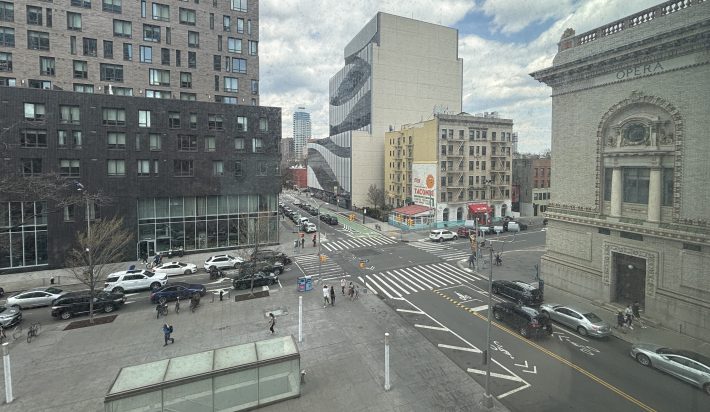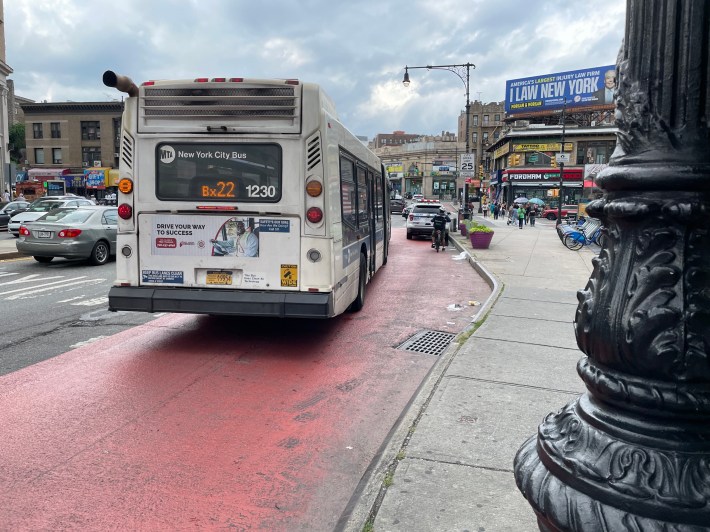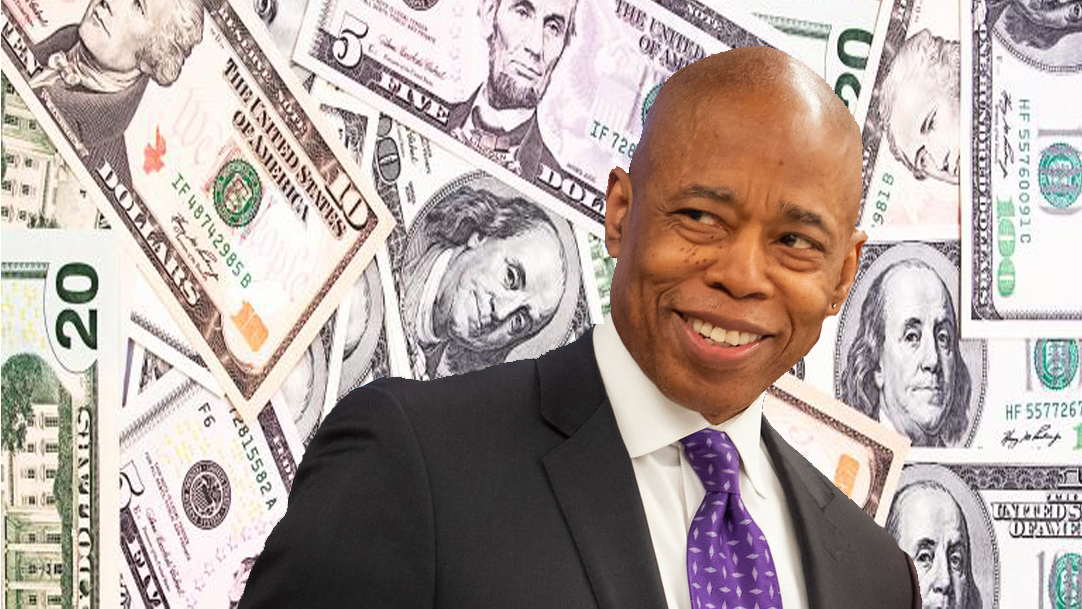A little money goes a long way for business interests that want to stop, slow down or scale back Department of Transportation street redesigns under Mayor Adams — just ask Tony and Gina Argento.
The Brooklyn film studio owners allegedly bribed Adams aide Ingrid Lewis-Martin to stop a street safety redesign of McGuinness Boulevard in Greenpoint. But the rot goes far beyond illegal bribery: Under Adams, the city routinely abandons DOT efforts to improve traffic safety and bus service — at the behest of interests whose influence comes from completely legal political donations.
Busways on Fordham Road and Tremont Avenue in the Bronx, a protected bike lane on Bedford Avenue in South Williamsburg, a protected bike lane on Ashland Place in Downtown Brooklyn and a planned road diet on Third Avenue in Sunset Park — all projects where Adams overruled his own DOT because of complaints from groups with access to the mayor's inner circle, often after months or years of planning and public outreach by city officials.
In each instance, DOT had a plan ready to go before political allies of the mayor pushed back and City Hall intervened to cancel or change the project — to hell with the implications for safety or bus service.
Lewis-Martin’s alleged illegal cash bribes are an outlier in a political system and mayoral administration where legal bribery is all-to-easy to pull off, according to good government watchdogs.
“The thing about McGuinness that’s interesting and pathetic is that Ingrid actually took cash bribes, and that’s rare,” said John Kaehny, the executive director of Reinvent Albany. “There’s a million other ways to bribe people without breaking the law.”
Ingrid's 'Crashland' coup
McGuinness Boulevard was far from Lewis-Martin's only anti-safety intervention on behalf of a corporate donor.
The same year Lewis-Martin took the alleged bribes from the Argentos, she intervened on behalf of Brooklyn developer Two Trees to carve the block outside one of its luxury towers out of DOT's Ashland Place protected bike lane.
The critical block of Ashland Place between Lafayette Avenue and Hanson Place still lacks a protected bike lane — creating a dangerous and confusing situation for cyclists (and drivers).

The Ashland Place reversal had key parallels to what happened with McGuinness Boulevard. For starters, like the McGuinness redesign, the Ashland project had the support of every elected official representing the area. (The reps reiterated their support in a letter to DOT this past April.)
Despite that popular support, Two Trees used its influence to stop the project. And the company’s power runs deep. Founder David Walentas and his son Jed, the company's current CEO, are longtime campaign donors of the mayor's and continue to support him financially.
Father and son each gave $400 to Eric Adams's first term mayoral campaign, campaign finance records show. And Two Trees gave $100,000 just this month to the Adams-aligned political action committee Empower NYC.
Those donations may be legal, but they still buy influence.
"Two Trees [have] been big political spenders for a long time,” said Kaehny. “That political spending is intended to give them influence, not just to who gets elected but what the people do after they get elected.”
Two Trees' managing director of external affairs, David Lombino, did not respond to questions from Streetsblog.
For-dumping on bus riders
A similar story played out on Fordham Road, a busy Bronx transit corridor where Adams refused to install a proposed busway because of opposition from local merchants narrowly focused on the needs of their driving customers.
In 2021, Adams campaigned on improving buses. As mayor, however, Hizzoner every year has fallen short of the benchmarks required by the city’s Streets Master Plan to install 30 miles of bus lanes in the city.
Fordham Road helps explain why: Peter Madonia, the owner of a bakery in Bronx Little Italy and a former chief of staff for Mayor Mike Bloomberg, worked with the Bronx Zoo and Bronx Botanical Garden to steer the Adams administration away from any potential bus lane or busway improvements.

The group of businesses wrote a letter to City Hall asking to sit down for dinner and explain their proposal. The rest was history — bus riders in one of the poorest City Council districts didn't stand a chance against big pocketed local institutions.
Madonia told Streetsblog that his dealings with the administration were all "on the merits" and that the busway plan was made without the neighborhood's best interest. He claimed "70 to 80 percent" of people visiting the neighborhood come by car.
“DOT’s rollout of the busway was horrendous and showed a lack of regard for the neighborhood. Our conversations with everyone, including the Riders Alliance, were conducted entirely on the merits," he said in a statement. "Our broad coalition included two BIDs and their businesses, and important cultural, educational and health care institutions that are part of a larger economic ecosystem."
But advocates disagree and stressed the importance of Fordham Road as a route for commuters in the Bronx. The idea was to improve the "transit desert" and help buses run faster and more reliably.
And the DOT's own survey from July 2019 found that 86 percent of people got to the area by bus, train or on foot.
“If you don’t have a car in the Bronx, and you have to cross the borough, you’re on Fordham Road,” said Danny Pearlstein, communications director for Rider’s Alliance. “It’s analogous to the situation with the Argentos and Broadway Stages. This isn't even their backyard, This is their sandbox. This is their playground. And they see themselves as utterly dominant."
Ditto on Fifth Avenue in Manhattan, where the needs of 110,000 daily bus riders across 40 routes have been no match for the powerful Fifth Avenue Association: Adams's plan for the corridor, which the business group co-signed, reneged on former Mayor Bill de Blasio's earlier plan to turn the strip into a busway.
Fifth Avenue Association CEO Madelyn Wils previously served as executive vice president at the New York City Economic Development Corporation, the city's publicly owned development agency. The group's president, former DOT Manhattan Borough Commissioner Ed Pincar, donated $2,000 to Eric Adams's re-election campaign in 2022, before he was associated with the Fifth Avenue Association, according to campaign finance records.
Who else paid Ingrid?
Adams's propensity for upending DOT projects at the behest of politically connected business interests has been widely documented. The role of illegal bribery in thwarting street redesigns was far less clear before Lewis-Martin's recent indictment.
Now groups who've come out on the winning end of street redesign policies are being forced to defend their dealings with Adams's City Hall.
Brooklyn Chamber of Commerce CEO Randy Peers, who fought the McGuinness project as well a safety project on a stretch Third Avenue, where a driver killed two people this summer, was apoplectic when a reporter from Crain's New York Business asked him about Adams's willingness to make policy at the bidding of groups like his. Despite his clear influence on Adams's decision-making, Peers insisted safety opponents "lose almost every battle."
“They’re completely remaking the streets of New York City unchecked, and we’re going to sit here and talk about the one or two times when they got called out for it,” Peers told the outlet. "We lose almost every battle when it comes to DOT, bike lanes, road diets and radical transportation advocates. And we’ve lost them under this administration, too."

Peers did not respond to Streetsblog’s request for comment about his dealings with the administration over Third Avenue. But Rabbi David Neiderman, executive director of the United Jewish Organizations of Williamsburg, told Streetsblog that the Satmar Hasidic community's dealings with the administration were all above board.
“Our advocacy and discussions were never conditioned on any other factors. It was, and always will be, focused solely on the well-being and safety of the community we serve,” he said in an email.
Though far from a business — UJO is a non-profit — the organized Satmar community has successfully used its leverage as a reliable voting block to change DOT projects in the past and vocally opposed the Bedford Avenue protected bike lane installed late last year.
Adams, who's desperate for votes in this November's mayoral election, gave the community what it wanted: First, he showed up for a town hall with Satmar leaders in May. Then, in June, he ordered DOT to rip up three blocks of the bike lane.
But the mayor's incentive for ripping up the lanes would have remained a secret if advocates hadn't sued to keep the lane in place: In court, DOT revealed that its own data showed that the bike lane made the street safer for pedestrians. The agency also disclosed several private meetings with UJO leaders about the project.
Miranda Spivack, a journalist and author of the recent book Backroom Deals in Our Backyards: How Government Secrecy Harms Our Communities and the Local Heroes Fighting Back, said that a lack of transparency in local government protects politicians and the business interests who want to influence their decisions — all at the expense of the average citizen.
“In a lot of these backroom deals between government and business, it's regular people who just get shut out and end up injured in some way," Spivak told Streetsblog. "There's a lot of potential harm to regular people."
Adams's repeated interference in street redesign projects underscores how easily special interests use their riches to buy influence.
In most cases, influence doesn’t even require illegal bribes. Politicians can start consulting firms when they leave office, promising the ear of those they made connections with while in public service (hello, Frank Carone). They can become lobbyists themselves — or they can take jobs for real estate companies or other businesses that want to shape public policy (hello, Andrew Cuomo).
“Projects can be humming along and seem like they’re inevitable and then all of a sudden they stall and often the public never knows why they stall out," Kaehny said. "The answer is probably politics. Powerful players intervened at the City Hall level."
“The Ingrid thing is a complete outlier in this era. It’s not because New York is clean — it’s just because the law and practice has evolved that you can make your money legally, so why break the law?"
City Hall did not respond to a request for comment.






